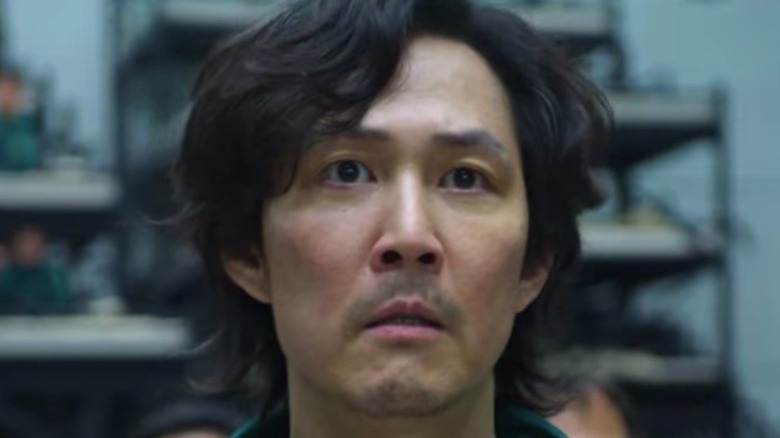
"Squid Game" is the biggest Netflix fad since "Tiger King" -- or, maybe, ever -- but this harrowing nine-episode Korean drama is likely to hold a grasp on our imagination for a long time to come. "Squid Game" continues to haunt us with its blend of cheery children's game aesthetics and abrupt, brutal violence, all of it set against same the backdrop of poverty, debt, and social disinterest that made previous Korean blockbuster "Parasite" so powerful to global audiences.
Our fascination with this bloody competition is fed by the mysteries it leaves behind. Series creator Hwang Dong-hyuk has spoken about a few of his ideas for a second season, which will delve into some of those unknowns. But for now, after our whirlwind has binge ended and we're wondering what the hell is going to happen to Gi-hun now, we've begun to speculate on some of the biggest questions that "Squid Game" leaves in its wake. Be advised, the rest of this article is about to drop some heavy spoilers for the show!
Who Is The Salesman?
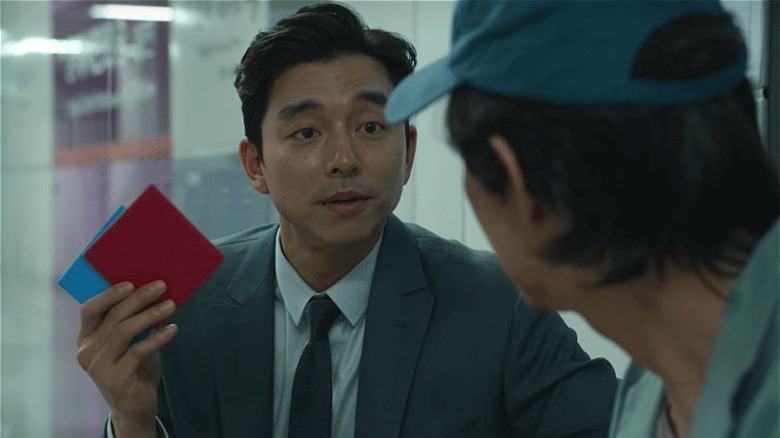
The Salesman is an exquisitely tailored, charming gentleman who recruits contestants for the Game. He's always well-informed about his target's social disrepair, and his psychological ploy of offering a slap to the face in place of financial loss is both foreshadowing to us and a useful test for how humiliated and desperate each candidate is. His behavior in the final episode also hints that he knows exactly what he's selling people into. He's casual about dodging Gi-hun, his sly good-bye indicating to the game's sole survivor that he can't be caught.
Gong Yoo is one of South Korea's most popular actors, so seeing him pop up in the premiere of "Squid Game" was a thrill for fans in the know. But, considering Gong Yoo's level of fame, his role as the unnamed solicitor is too small. It's a good twist that makes this character's impact feel huge, implying that there's so much more to the Salesman than we know. He's not cold enough to feel like a former winner, though. This is a man who feels like he never faced hardship himself.
Our theory: The Salesman is one of the personal assistants of the game's secretive creator, and is trusted to know what the game's master likes to see in a contestant.
What About The Contestants Who Quit?
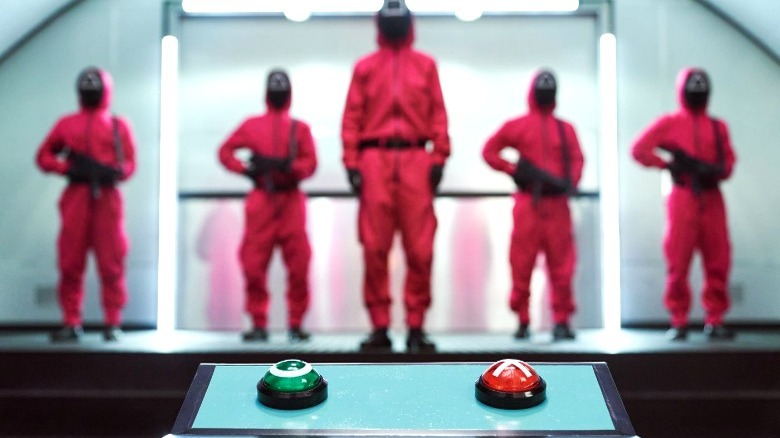
The Game has clauses that even its creators abide by, including the third clause, which says that a majority vote to quit the Game means that the players can forfeit the prize money and go home. Aging player 001 casts a tie-breaking vote to put this clause into effect, sending the survivors of the shocking first game home for a little while. The option to return remains, but the contestants that do are now aware of the violence waiting for them.
Only 14 players don't come back by the end of the episode. The majority return to play again. There's a chilling throwaway line about those 14 contestants, though -- they're to remain under observation by the game's operators. The reason is unknown.
Our theories: Seong Gi-hun's first instinct when returning to the Game was to try and alert the authorities about the game's existence. Observation by the operators may reduce the chance of others succeeding in this mission, tanking news stories and shutting down curious investigators. Or, perhaps these 14 ex-players may be re-approached for a future game, when they're even more desperate. A second season might bring back some of these players and give us some answers.
Was The Front Man Aware Of The Organ Harvesting?
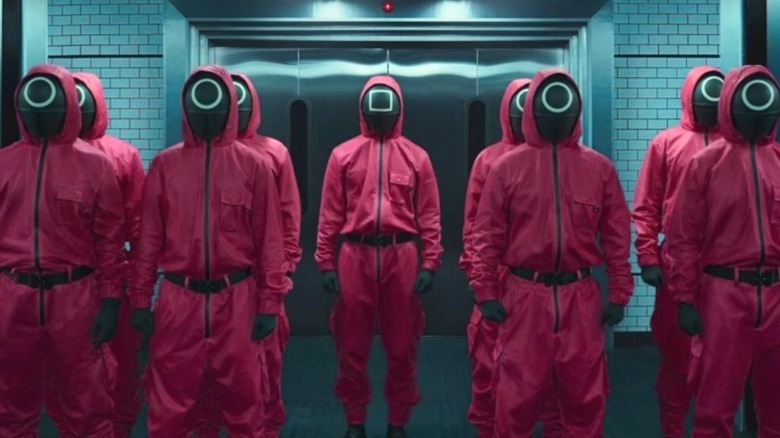
A third of the way into "Squid Game," we learn that there are always parasites feeding off of the biggest sharks. Enterprising pink-suited workers have recruited a doctor from the current game, Contestant 111, who is helping them harvest organs from not-quite-dead losers to sell on the black market. The pink suits have their secret gig down to a science, with one accomplice redirecting cameras to hide their trips down to their bloody lair. Another pair wait on standby, delivering the organs to waiting buyers via scuba dive.
When the situation gets out of hand and 111 makes a break for it, the Front Man gets involved. But his anger isn't with the small fry wetting their beaks, although he does execute them. Rather, the Front Man is upset that the game's rules are upended by the doctor's unfair advantage, and his apology sounds eerily genuine. Whether the Front Man knew what was happening all along isn't clear; his focus is on the purity of the game.
Our theory: Not much gets past the Front Man, and the organ harvesting scheme has been going on for years. His job is to see that the rules are obeyed, that the game is fair, and that the VIPs are happy. Anything else is not his concern. It's our opinion that he suspected what was going on, and that the game's creator found it an amusing sideshow, another testament to the Game's capitalistic greed.
Why Does The Front Man Serve The Game?
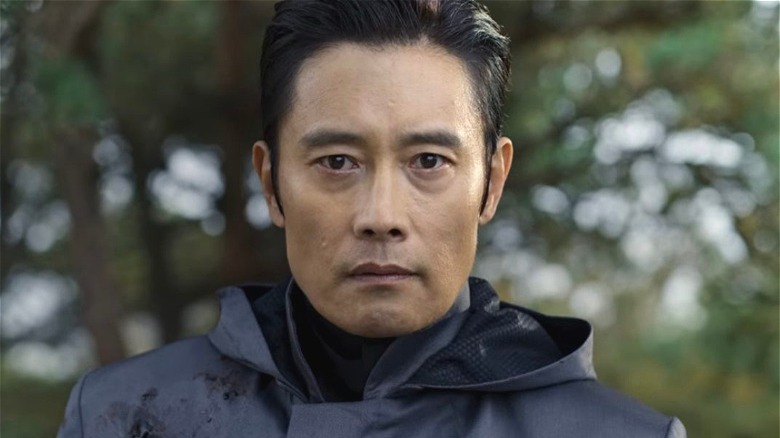
The revelation of the Front Man's identity is horrifying. Officer Hwang Jun-ho infiltrates the island where the game is held and discovers that his missing brother won the Game in 2015. Worse, he also learns that his brother is the person under the Front Man's black mask when he's trapped and held at gunpoint. As the Front Man, Hwang In-ho is as emotionless as his mask when he shoots Jun-ho, but we later see that hurting the brother to whom he once gave his own kidney does deeply impact him.
The Front Man spends most of the Game at a distance, standing atop the grid of faces and saying little as they're whittled down. He's polite to the VIPs and, as a former cop, intensely aware of his surroundings. There's no hint as to how the Front Man won the Game in 2015, but the final episode reveals that winning is no solace. So, why would he go back to that horror and help perpetuate it?
Our theory: Gi-hun's reaction to winning the Game is our biggest clue. He's shattered by his experience. In-ho's win might've felt similar, but his police and military discipline made him a colder person. Like Gi-hun, In-ho was probably invited to meet the game's creator -- only instead of playing one more game, In-ho received an offer to oversee the lives of hundreds of others. For the sake of his own sanity, he agreed. The fates of both of these men leave have chilling implications for other winners.
Did Jun-Ho Actually Die?
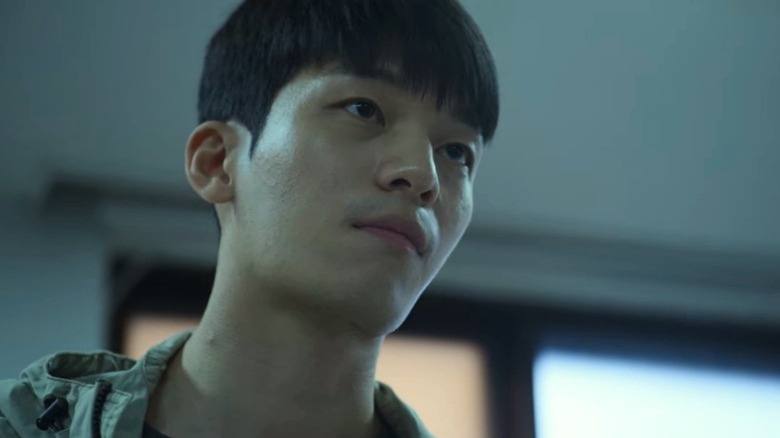
Nobody's dead in a movie or TV show until we see their body. After Officer Hwang Jun-ho scrambles up a mountain to send out the proof of what's going on at the sadistic private island, he's cornered by the Front Man and a squad of pink-suited soldiers. The Front Man offers him a chance to survive if he surrenders, and he's not too worried about Jun-ho's text messages. Jun-ho refuses to stand down, even when the Front Man reveals that he's actually Jun-ho's missing brother.
The Front Man shoots Jun-Ho high in the body, and the impact throws Jun-ho off the tall, straight cliff and into the churning seawater. Curiously, after hours of chasing Jun-ho through the island's secret warrens and tracking the GPS on the diving equipment, there's no order to go look for Jun-ho's body.
Our theory: In-ho, the Front Man, is consumed by his guilt. In his mind, he shot to kill. But the placement of the shot and the lack of a body leaves room for questions about Jun-Ho's survival. "Squid Game" isn't shy about showing off corpses, and the only other time the camera cuts away from a huge, emotional kill like this, it's revealed that the victim lived. Jun-ho might not have survived, but the show made a deliberate choice to leave his fate ambiguous -- for now.
Did The Police Get Jun-Ho's Messages?
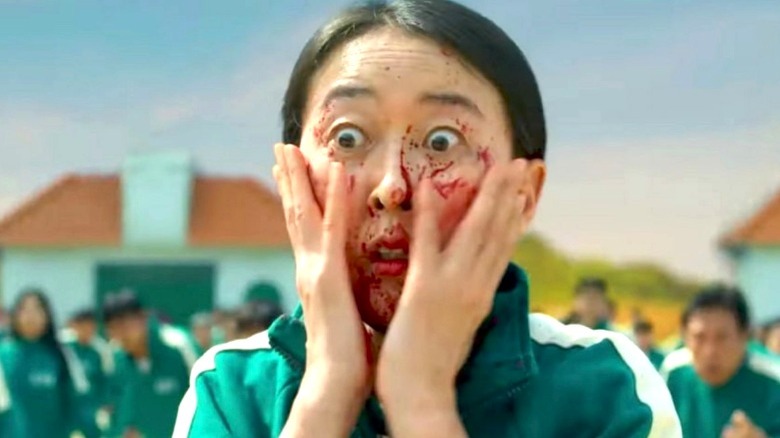
Officer Hwang Jun-ho is diligent about recording what he sees on the Game's island preserve, even forcing a VIP to confess unknown details at gunpoint. He races to find a place to contact his chief and send out the information he's gathered, but the results of his efforts aren't shown. The Front Man isn't worried, and we're shown how weak the phone signal is.
In addition to Jun-ho's struggles, there are worrisome hints about the police earlier in the series. Gi-hun's attempts to blow the whistle on the Game fall on deaf ears when he goes to his local police station. It's a wild story, sure, but the police call a single phone number and then throw Gi-hun out on his butt when it doesn't yield results. They police aren't interested in doing legwork; the implication is that eager Jun-ho is a special case.
Our theory: Showrunner Hwang Dong-hyuk deliberately chose to show the police this way, tapping into global fears and resentment over police culture. The police in "Squid Game" are undiligent, incurious, and otherwise incompetent. If Jun-ho's messages did get out, it'll be easy for the Game's operators to squash any investigation. Jun-ho's good police work is a shaggy dog story, unless Gi-hun finds his files. Dong-hyuk has already suggested that the police will be the focus if the series returns -- Jun-ho's messages are likely to become some of that groundwork.
Are There Other Squid Games?
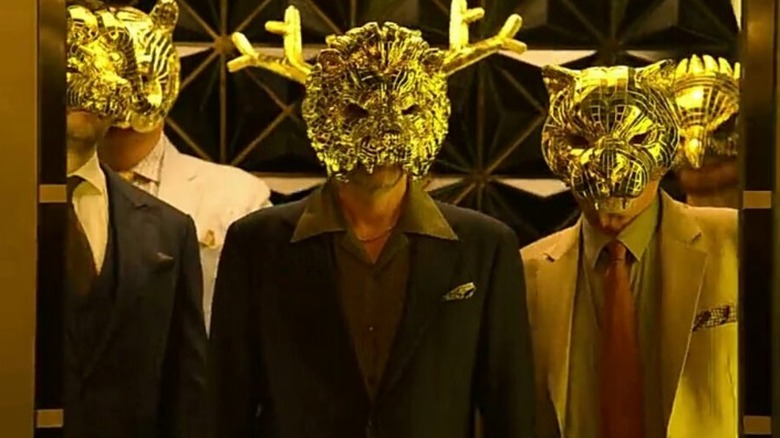
Another horrifying throwaway line pops up when the VIPs arrive on the Game's secret island. The Front Man is eagerly told how great the Korean Game is, implying that there are more blood money contests going on worldwide. The VIPs themselves are grotesqueries, cartoonishly evil men with wealth and privilege beyond measure.
The VIPs arrive on the island like it's the Super Bowl, ready to lounge in luxurious surroundings, eat like Roman emperors, and watch the final rounds of the Game as close to in-person as they can get. These sick jerks watched the early rounds from the comfort of home, but these are the really good parts, and demand live viewing. All that's missing is a prop comic to splash some fresh blood on them.
Our theory: There's nothing to theorize here. There are other games, a metaphor for the spreading plague of upper-class entitlement and the rich's amusement at the expense of the desperate. That horror is one of the core themes of the show, and any country with a deep economic divide and a lack of a social safety net is going to be ripe for exploitation. The VIPs will prey on individual cultures, incorporating local games like Musical Chairs and Hot Potato. "Squid Game" invites us to imagine what this might look like in our own countries (just don't get any ideas for cheap remakes).
How Much Of The Game Was Actually Rigged?
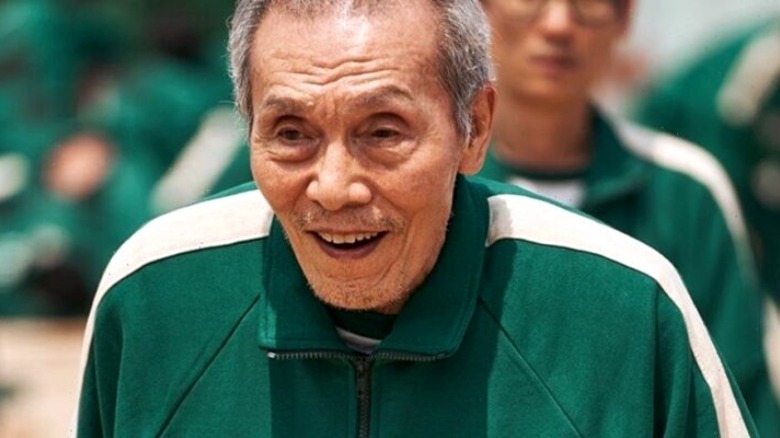
A big deal is made about how fair the Game is meant to be, with simple games and simple rules. Major transgressions are swiftly punished. But plenty of hypocrisy becomes evident as the Game reaches its climax, and the Front Man isn't above changing the playing field mid-game in order to please the VIPs.
That's not the ugliest moment. The worst is when we learn that 001, Oh Il-nam, didn't actually sacrifice his life for Gi-hun during the Marbles challenge. In fact, he's the rich monster behind the Game, and, dying of a brain tumor, wanted to join in to feel the joy and fear of being a kid on the playground one more time. The alley where the marbles game is played is even based on his old neighborhood. The entire Game is for him.
Il-nam seems to face real peril during the challenges, but it's a lie. He's leading the charge during Red Light, Green Light, and he's on his own for the dalgona challenge. Tug-of-War could have gone very badly for the old man. Sharp-eyed viewers noticed a few things in Il-nam's favor starting early on, however. The creepy doll doesn't scan Il-nam the way she does everyone else, and he's not padlocked to the rope during Tug-of-War. He claims a simple shape for dalgona, and he's not as shaky as we think. He's familiar with all the games, and he makes sure to dip out well before the final, bloody challenge.
Our theory: The entire premise of the game is a lie, because in the end, the VIPs will please themselves before they treat others fairly. That's key to understanding "Squid Game."
How Deep Does The Conspiracy Go?
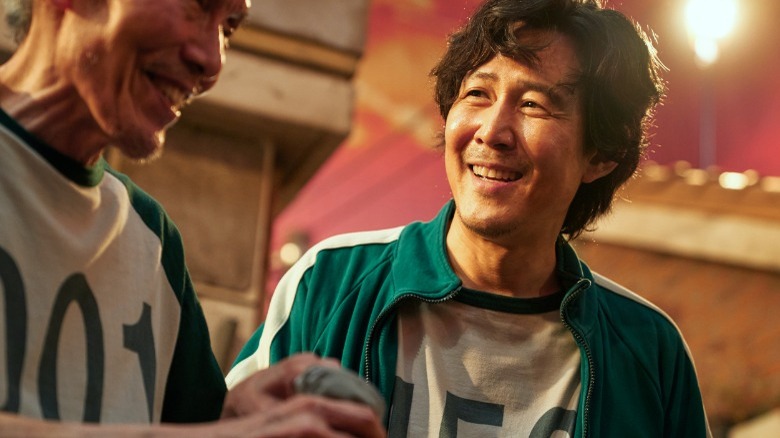
The Game is an expensive and dangerous undertaking, requiring a massive number of resources to make it happen annually. It's an event for the VIPs who watch and bet on the games, and it requires several hundred people to go missing -- and stay missing. An organ harvesting scheme happens under its umbrella, and nobody comments on it. The police won't bother to investigate. It's possible that, if they did, they'd quickly be told to stop.
American horror franchise "The Purge" gradually revealed that its annual gorefest was a political and sociological tool to control the state. "Squid Game" doesn't use science fiction or alternate history to set up its premise, relying instead on the power of the elite to slip its game into too-realistic shadows. We don't know who the VIPs are, but we know that they're crass and entitled. The Game's creator is an insanely rich cynic who wanted to feel like a kid again, albeit one who pulls the wings off bugs. It's gross and heightened, but the horror behind "Squid Game" is that it feels like something that could really happen.
Our theory: Plenty of politicians and billionaires watch the Game, and it's in their interest to keep things flowing smoothly. Money changes hands to keep people looking the other way, and as much as the game's creator derides the lower rungs of human society, he ignores that he's directly profiting from making more victims. In "Squid Game," the conspiracy goes as deep as it needs to go to make the point that nurturing social kindness, no matter what, is the only way to kill off the festering, selfish greed that's overtaken our world.
Read this next: The 12 Best Video Game Movies Ranked
The post Unanswered Questions We Still Have After Watching Squid Game appeared first on /Film.
0 Comments